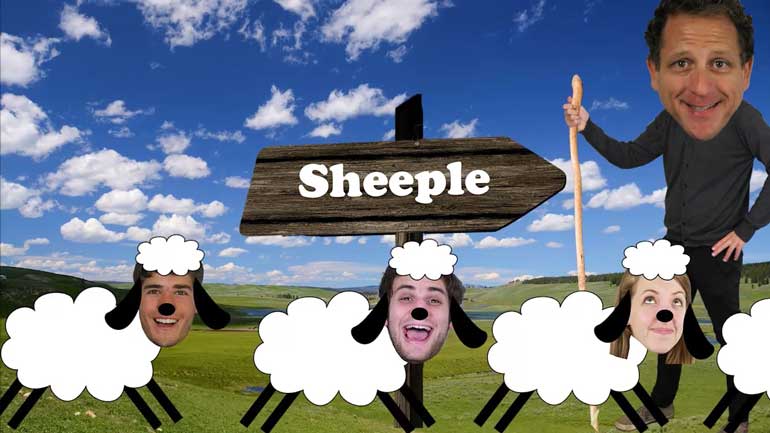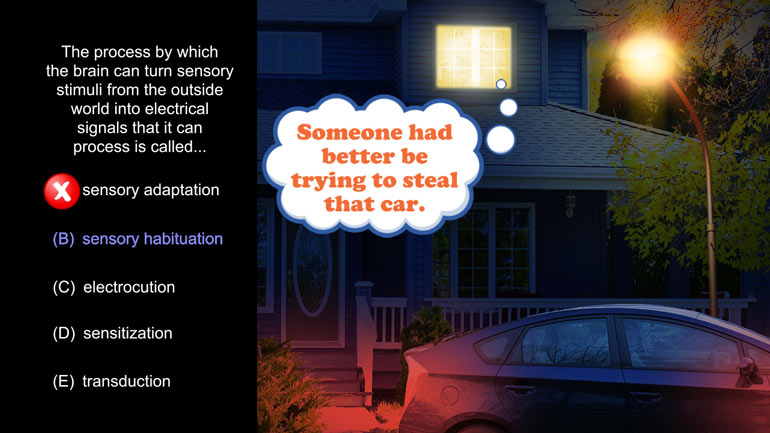ShmoopTube
Where Monty Python meets your 10th grade teacher.
Search Thousands of Shmoop Videos
AP Psychology 1.2 Learning 12 Views
Share It!
Description:
AP Psychology 1.2 Learning. Learning that influences our voluntary behavior is known as what?
Transcript
- 00:03
And here's your shmoop du jour brought to you by classic [Man splashes conditioner on head]
- 00:06
conditioning it's how Beethoven got those silky locks here's our question
- 00:11
learning that influences our voluntary behavior is known as what and here are
- 00:18
the potential answers... when
- 00:23
you think of A classical conditioning you might think of Pavlov and his [Pavlov with lots of dogs]
Full Transcript
- 00:28
slobbering canines, mostly because you've been classically conditioned to
- 00:32
associate classical conditioning with that experiment
- 00:35
cool huh anyway classical conditioning is the process in which an innate
- 00:39
response like drooling to a potent stimulus, like delicious food can come
- 00:44
to be elicited in response to a previously neutral stimulus like a bell [A bell ringing]
- 00:49
let's see it in action ring a bell, bring food, doggy drools ring
- 00:54
a bell, bring food, doggy drools over and over and over again and then one day
- 00:58
ring a bell but don't bring food what happens doggy still drools [Man rings bell and dog appears drooling]
- 01:03
that's classical conditioning so does this fit what we're looking for
- 01:07
no we're looking for learning that influences our voluntary behavior is
- 01:13
drooling voluntary unless you're actively trying to drool in order to [Man drooling]
- 01:17
gross someone out then no it's not so this can't be it if we're looking for
- 01:22
learning that influences voluntary behavior then behavioral conditioning
- 01:26
sounds about right almost as right as the ringing of the [Person ringing a bell]
- 01:29
bell sorry drooled a little bit there anyway while it might sound right it
- 01:34
also sounds a bit like it doesn't exist because it doesn't, because behavioral
- 01:40
conditioning is actually known as operant conditioning which is the answer
- 01:45
we were looking for and actually includes both reinforcement and
- 01:48
punishment.. Operant conditioning involves the use of reinforcement and punishment
- 01:53
to modify behavior and specifically helps in teaching adaptive conscious [Definition of operant conditioning]
- 01:57
behavior let's look at our pal Mikey for a second Mikey here clearly doesn't like
- 02:02
cleaning his room a whole lot however he realizes that by doing it he keeps his [Mikey sweeping his bedroom]
- 02:06
parents happy and is able to earn an allowance because of it two positive
- 02:11
forms of reinforcement that influence his voluntary behavior
- 02:15
and as for the punishment well he knows that if he doesn't do it he'll face the
- 02:18
wrath of yeah her so while D and E are part of the correct answer the complete
- 02:24
answer we're looking for is B and if you'd excuse us we have to clean up
- 02:28
the drool stop bringing that thing it's not funny [Man mopping up doggy drool]
Up Next
AP Psychology 2.2 Social Psychology. Which of the following was an independent variable manipulated in Asch's research?
Related Videos
AP Psychology 1.1 Personality. According to Freud, these three parts of personality are constantly in conflict.
AP Psychology 1.1 Sensation and Perception. The process by which the brain can turn sensory stimuli from the outside world into electrical signals...
AP Psychology 1.1 Social Psychology. Which of the following best describes social psychology?
AP Psychology 1.1 States of Consciousness. Who conducted research on REM sleep deprivations?




